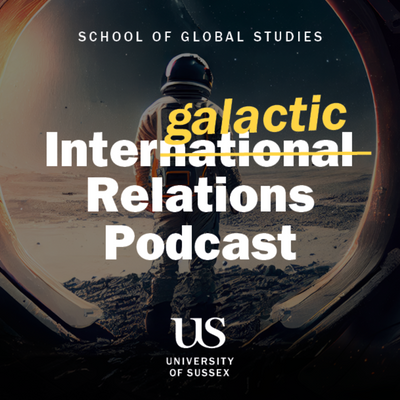Based on research seminars at the University of Sussex Department of International Relations, the Intergalactic Relations podcast, hosted by Dr Faiz Sheikh, analyses Star Trek: The Next Generation, applying insights from staff and students. The podcast is for Star Trek and International Relations novices alike, a relaxed and entertaining way to learn about world politics.

The Department of International Relations is based in the School of Global Studies, a global hub at the heart of the University of Sussex. Our engaged research and critical pedagogy addresses the most pressing global issues of our times – global inequalities and global justice, climate and environmental change, war and peace, global health and finance crises, intolerance and discrimination. Our mission is to generate knowledge and understanding that can make a difference, for a fairer, safer, more sustainable and more inclusive world.
Why Star Trek The Next Generation? This show is episodic in format so we can watch any episode, in any order, and it should make sense to everyone. It began to air in 1987 and wrapped up in 1994. It is utopian in its depiction of a post-scarcity, post-racial society, who now explore the stars. Humanity is living the liberal dream, it would seem. But then the wars in former Yugoslavia happen, the US botch a military intervention in Somalia, and in general the rosy picture of the end of the Cold War begins to be tarnished. This real-world funk seeps into the show by the latter seasons. In this podcast series we will note how the utopianism and optimism of earlier seasons give way to cynicism and tacit acknowledgement of the darker side of this TV liberalism.
- In this episode firecracker Ensign Ro goes undercover to dismantle a terrorist cell, the Maquis. She comes to see the Maquis cause as just, and the rules and legality of […]
- In this episode we meet Worf's cheeky foster brother as he compels our protagonists to help a population that they would otherwise leave to harm under a principle of non-interference. […]
- Episode notesIn this episode we explore a region of the galaxy where the fabric of space is being damaged by the very method of space travel used by The Enterprise. […]
- In this episode we unpack questions of legitimate use of force under liberalism, and perhaps how the 'other' can discover ‘our’ liberal individualism and free themselves from their oppressive power […]
- This episode we navigate sexuality and gender, 1992 style. We explore an alien society which is apparently genderless. What happens when one of them falls in love with one of […]

